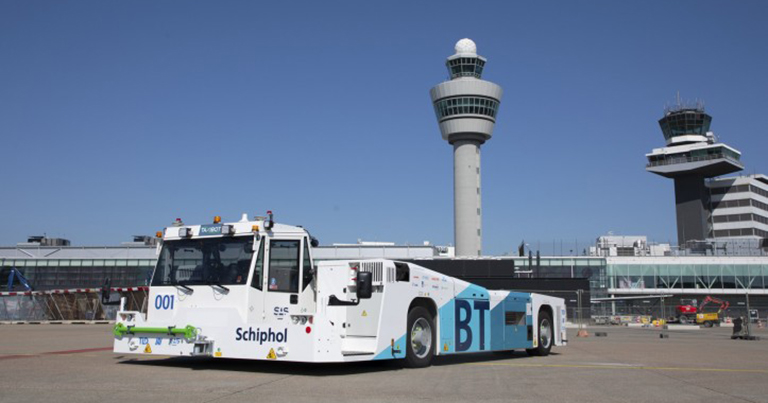
Schiphol and its partners are to begin an aircraft sustainable taxiing trial. Aircraft will be brought to the runway by a special tow vehicle, also known as the “taxibot”, during the trial. This means that aircraft engines will mostly remain turned off during taxiing.
This test is being conducted by Schiphol with Air Traffic Control the Netherlands, the Ministerie van Infrastructuur en Waterstaat (Ministry of Infrastructure and the Environment), Corendon Dutch Airlines, KLM, Transavia, easyJet, and the airline handlers dnata and KLM Ground Services. The tests began by towing an empty Corendon plane to various runways. If the test is a success, the trial will continue to an operational aircraft in the next phase.
The special tow vehicle belongs to Smart Airport Systems; a sister company of TLD, the supplier of ground-handling equipment. The vehicle is one of only 10 in the world. It is powered by a hybrid combination of electric and diesel engines and consumes 95% less fuel when taxiing than aircraft engines would normally use.
Schiphol expects to achieve total savings of 50-85% on fuel consumption during taxiing because engines need to warm-up for a few minutes before departure. Measurements will be taken during the testing phase to see what fuel savings can be made in practice, which can then be used to reduce emissions at Schiphol. Departing aircraft take 14 minutes to taxi, whereas arriving aircraft take around nine minutes.
The trial will last through June and is part of a feasibility study into sustainable taxiing at Schiphol. Some of the items being investigated include how sustainable taxiing can be integrated into daily operations, whether it is achievable on a large scale and how long and in what time period the transition phase should be. This feasibility study is expected to be complete in autumn 2020.
The trial is part of the smart and sustainable sector plan and is being conducted with the approval of the Inspectie Leefomgeving en Transport (Human Environment and Transport Inspectorate, or ILT).
Hassan Charaf, Head of Innovation, Royal Schiphol Group, said: “This study aligns with our ambition to be the world’s most sustainable airport. We are continuing with this important test despite the situation that the corona crisis has caused. This unique vehicle will be at our disposal until at least June. I am proud that Schiphol and its partners are investigating what sustainable taxiing at Schiphol can mean.”






